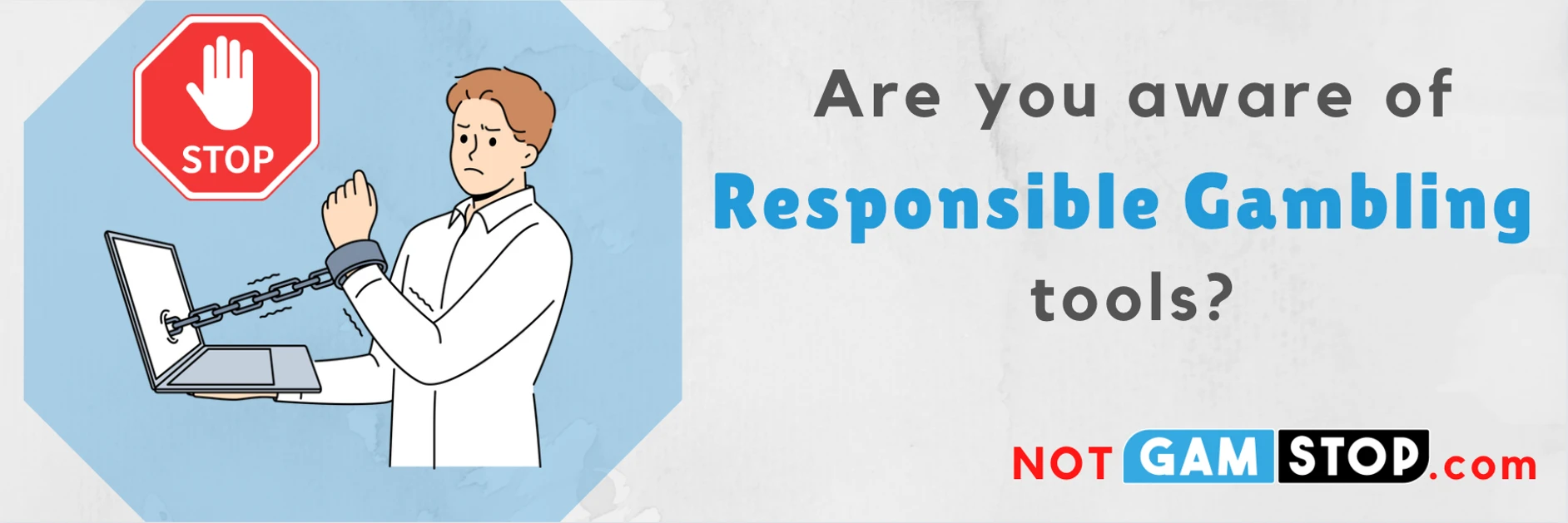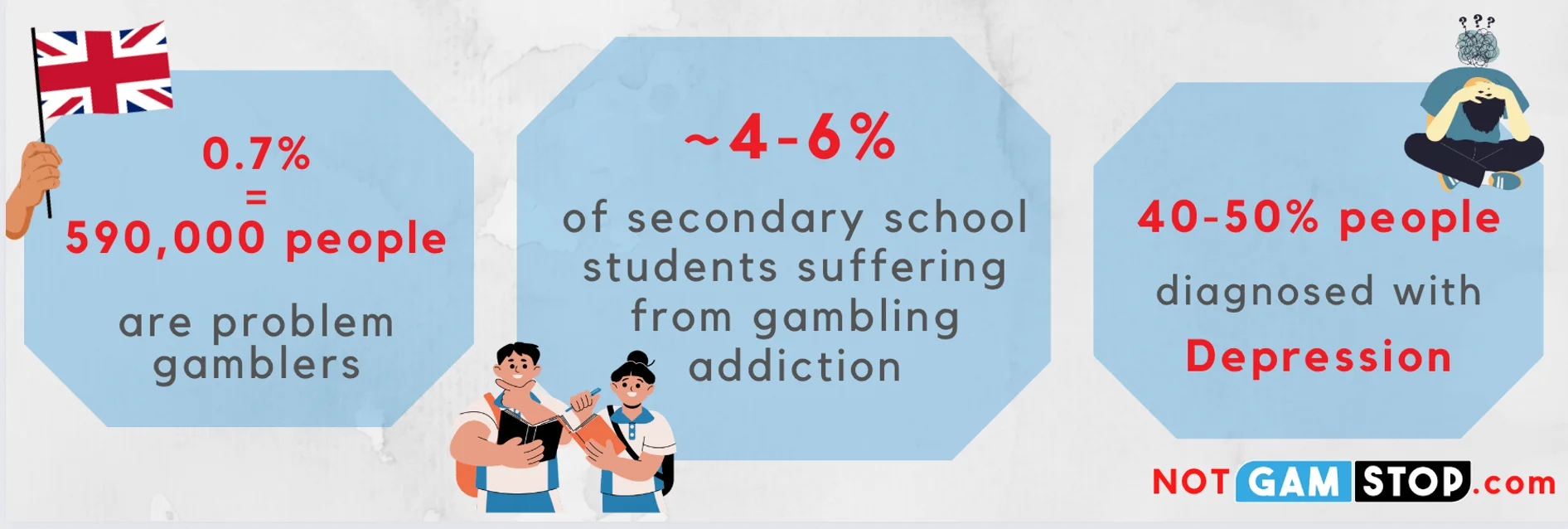A responsible approach to gambling is extremely important to prevent the development of pathological addiction. The Not GamStop team strives to provide a safe and controlled environment for players. Understanding the risks associated with gambling, we want to share comprehensive information about responsible gambling, signs of problem gambling, and ways to overcome gambling addiction.
What is Responsible Gambling?

Support Tools for At-Risk Gamblers
According to the Public Health England report, 0.5% of the UK population are problem gamblers, and 3.8% are ‘at-risk’ gamblers. To protect such players, online casinos offer self-management tools like self-exclusion, deposit limits, time-outs and activity notifications. It is essential that customer service and support staff undergo responsible gambling training to effectively assist and manage players showing signs of gambling problems. Operators are required to provide responsible gambling services that include self-exclusion tools and loss limits to protect players.
The main aspects of responsible gambling include:
- protecting vulnerable players
- preventing underage participation
- safeguarding data confidentiality
- guaranteeing payouts
- ethical marketing
Preventing Underage Gambling Safely
In the UK, gambling is only permitted for those aged 18 and above, with the exceptions of football pools, lotteries, and the National Lottery, which are accessible from age 16.
Operators apply must enforce strict measures to ensure responsible online gambling, including age verification checks and real-time monitoring to prevent underage users from gambling.
To enhance player safety, reputable operators integrate responsible gambling software that facilitates effective self-management tools such as deposit limits and time alerts.
It is known that gambling can lead to addiction, especially among individuals with mental health issues.
Securing Transactions and Compliance
Responsible operators also ensure the security of financial transactions, using encrypted payment systems and strictly adhering to GDPR requirements for personal data protection.
Gambling advertising in the UK is regulated by the Gambling Commission to prevent targeting vulnerable groups and to inform about the risks. Under the responsible gambling UK regulations, operators must ensure that all promotional activities are fair and transparent.
The UK responsible gambling regulations are designed to ensure that gambling remains a safe activity, with strict guidelines and enforcement measures to protect all participants.
What are the Signs of Gambling Problems?
Gambling addiction is a serious disorder that can severely impair an individual’s quality of life. In order to help those struggling with this problem, it is important to be able to recognize the early signs of gambling addiction. Developing new responsible gambling ideas is crucial to provide timely interventions and prevent the further development of addiction.
Around 0.7% of the UK population, approximately 590,000 people, are problem gamblers. The statistics are even more concerning among the youth, with around 4-6% of secondary school students suffering from gambling addiction. Furthermore, there is a worrying trend that the number of gambling-related problems among 16-24 year-olds has doubled over the past 3 years.
Gambling addiction is often accompanied by other mental health disorders, such as depression and anxiety. In fact, 40-50% of people suffering from gambling addiction also have a diagnosis of depression. Moreover, problem gamblers are at a much greater risk of suicide, with one in five attempting to take their own life, which is 20 times higher than non-gamblers.
Professionals use a range of diagnostic criteria to determine the presence of gambling addiction. These include:
- The need to gamble with increasing amounts of money to achieve the same level of excitement.
- Irritability or restlessness when trying to cut down on gambling.
- Frequent unsuccessful attempts to stop gambling.
- Persistent thoughts about gambling (past and future gambling experiences, ways to obtain money for gambling).
- Gambling as a way to escape negative emotions.
- Returning to gamble after losing money (chasing losses).
- Lying to conceal gambling activity or its consequences.
- Jeopardizing or losing relationships, work or opportunities due to gambling.
- Relying on others to provide money to deal with gambling-related financial problems.
If an individual exhibits four or more of these signs over the course of a year, it may indicate the presence of a gambling addiction. However, a consultation with a specialist is necessary to make an accurate diagnosis and rule out other possible mental health conditions.
Timely identification and treatment of gambling addiction is crucial. The data shows that 15% of problem gamblers in the UK commit crimes to support their addiction, and over 420,000 British individuals lose more than £2,000 annually in online gambling. Furthermore, the government’s economic analysis for 2023 estimates the direct financial costs associated with harmful gambling to be £412.9 million. A comprehensive approach involving psychologists, psychiatrists and social workers can help those struggling with gambling addiction return to a healthy and productive lifestyle.
What Causes Gambling Addiction?
Gambling addiction, also known as ludomania, is a complex disorder that arises from a combination of various factors. There is no single clear cause of this addiction — it encompasses biological, psychological and social elements, as well as co-occurring conditions. Understanding these causes can help better comprehend this disorder and find effective ways to overcome it.
| Biological factors | Play a key role, as certain aspects of ludomania are very similar to drug addiction. Pathological gamblers exhibit more physical symptoms during withdrawal than drug addicts. Additionally, winning in gambling activities triggers the same neurochemical reactions in the brain as the use of cocaine. Deficits in important substances like noradrenaline and serotonin are also linked to compulsive gambling behaviour. |
|---|---|
| Psychological factors | For instance, the belief that past events can influence future outcomes. This motivates addicted gamblers to continue placing bets in the hope of “recouping their losses”. Other cognitive distortions, such as the illusion of control and overconfidence, also increase the risk of developing gambling addiction. |
| Social environment | Issues at work or home, stress, loneliness and lack of support can trigger the emergence of gambling problems. Furthermore, gambling addiction can be transmitted within families across generations. Interestingly, individuals aged 20-29 are most likely to engage in gambling and develop addiction-related issues. |
| Сo-morbidities | People with addictions such as alcoholism, drug addiction, depression or anxiety disorders should be aware of the increased risk of developing a gambling addiction. For example, 40-50% of people who suffer from gambling addiction are also diagnosed with depression. Moreover, one in five problem gamblers will attempt suicide, which is about 20 times higher than non-gambling addicts. Consultation with a specialist can help to make the correct diagnosis and prescribe appropriate treatment. |
Overall, gambling addiction is a multifaceted problem, stemming from a complex interplay of biological, psychological and social factors. Understanding these causes can help better navigate this disorder and find effective ways to overcome it.
Recognizing You Have a Problem
Currently, the problem of gambling addiction is officially recognised as a disorder of health. On 18th June 2018, the World Health Organization included gambling disorder in the International Classification of Diseases, 11th Revision (ICD-11). It is important to note that only a qualified specialist with the appropriate certification can make an accurate clinical diagnosis of this disorder.
We offer a short test prepared by our experts to help determine the level of your gambling addiction or to assist someone close to you who may be affected. This test cannot replace a formal clinical diagnosis but can provide an initial assessment.
How to Stop Gambling Addiction
There are several evidence-based approaches that can help individuals overcome gambling addiction. These include structured treatment programmes, therapeutic interventions, community-based support, and self-directed recovery methods. An understanding of the available options is crucial for those seeking to break free from the grip of problem gambling.
- Participating in 12-step programmes, such as “Gamblers Anonymous”, specifically designed for treating gambling addiction. They focus on creating financial stability, improving mental health, and measurable recovery outcomes.
- Motivational interviewing is a common therapy method for gambling addiction. The interviewer listens empathetically to the gambler, helps them understand conflicting emotions, and motivates them towards change, without using aggressive confrontation. The emphasis is on the patient’s freedom of choice and strengthening their confidence in their ability to change.
- Online support groups are increasingly used by problem gamblers for anonymous recovery, without disclosing their issue to loved ones. The peer support format protects confidentiality and allows individuals to tackle the addiction independently, but recognising the problem and finding the determination to pursue recovery is crucial. Implementing a responsible gambling service within online support frameworks enhances their effectiveness.
- Self-help methods in a 2006 study, Wendy Slutske, a psychology professor from the University of Missouri, found that around a third of pathological gamblers were able to overcome their addiction naturally without professional treatment. The key factors associated with this natural recovery were a younger age of onset of gambling, the absence of co-occurring personality disorders, and less severe symptoms of gambling at the peak of the addiction. These individuals utilised various self-help methods such as changing their thoughts and behaviours, support from family and friends, and avoiding gambling-related situations.
- Programmes for self-exclusion (voluntary exclusion from gambling) have demonstrated the ability to help some, but not all, gamblers reduce their gambling frequency. Some experts argue that casinos generally organise self-exclusion programmes as a public relations measure, but do not actually help many of those with gambling problems.
Problem Gambling & Addiction: Myths vs. Facts
To effectively deal with this addiction and help its victims, it is necessary to understand the true nature of the problem. The following table debunks common myths about gambling addiction:
| Myth | Fact |
|---|---|
| Gambling only becomes a problem if the gambler can’t afford their losses. | Financial difficulties are just one potential consequence of gambling addiction. Some gambling addicts face serious problems long before financial ruin: they risk losing their job, family breakdown, and health issues from neglecting themselves. Addiction is destructive, regardless of the size of the bets. |
| Rare engagement in gambling activities does not result in addiction. | Frequency of gambling is irrelevant. Even if someone gambles only a few times a year but binges uncontrollably each time, unable to control the urge to bet — these are already signs of pathological addiction. The development of gambling addiction is determined not by the schedule, but by uncontrollable behaviour. |
| Responsible people don’t become gambling addicts. | Gambling addiction is a disorder that can affect anyone, regardless of social status, profession or general responsibility in life. It is an illness that robs people of control over the situation. No one is immune to its development. |
| Children and teenagers are not susceptible to gambling addiction. | In the era of mobile gaming and accessible online casinos, more and more minors are getting involved in gambling and developing an unhealthy craving for it. Gambling addiction in the family also negatively affects children’s attitudes towards gambling. People of any age are at risk. |
| One should help the gambler pay off debts to solve their problem. | Although it’s difficult for loved ones to accept, paying off a gambler’s debts usually only exacerbates the situation. For an addict, it’s a “safety net”, permission to continue gambling. Real help lies in treating the underlying addictive craving for gambling. |
Protecting Minors

Combating underage online gambling is more challenging, but operators take measures to ensure their customers are 18 or 21 and over. Age verification systems are used, and sometimes third-party checks are conducted. Gambling websites clearly state that gambling is illegal for minors. Recent discussions on new limits for online slots emphasise the ongoing efforts to refine these protective measures.
However, this system has limitations, so parents are advised to take additional precautions:
- Use passwords and avoid saving account details
- Log out of gambling sites after use
- Keep devices with access to gambling accounts out of reach of children
- Limit and regularly monitor children’s online activity
- Educate children about the dangers of gambling
There are also specialised parental control programs, such as Net Nanny, Cyber Sitter, and Qustodio, which help monitor and restrict children’s online activities. Additionally, a 2023 report by the UKGC highlights that almost 50% of modern youth engage in gambling, underscoring the importance of these safety measures.
Responsible gambling tools
Gamstop
Gamsblock
 Gamblock scans the content of each web page to detect mentions of gambling activities. If such mentions are found, the program blocks the page and returns the user to their homepage. The software uses its own original algorithm to analyse and block gambling content.
Gamblock scans the content of each web page to detect mentions of gambling activities. If such mentions are found, the program blocks the page and returns the user to their homepage. The software uses its own original algorithm to analyse and block gambling content.
Gamblock allows users to set a self-exclusion period from 1 to 5 years and provides the ability to customise Gamblock Features to block individual speculative services such as fantasy sports, stock trading, and cryptocurrency content. A key feature is that you can not remove Gamblock until the licence expires, so the user needs to meet with a gambling counsellor to obtain an uninstallation key.
Gamban
 The Gamban tool is designed to block access to gambling and betting sites, helping users combat gambling addiction. User reviews vary greatly: some praise the app for its effectiveness and good customer support, while others point out issues with bypassing the blocks. One of the most frequent complaints from Gamban users is the ability to bypass the blocks set by the app. Many users note that with the help of a VPN or certain device settings, it is easy to circumvent the restrictions imposed by the program, reducing its effectiveness in preventing access to gambling sites. It is also mentioned that the app sometimes causes technical issues and can interfere with the functioning of other applications on the device.
The Gamban tool is designed to block access to gambling and betting sites, helping users combat gambling addiction. User reviews vary greatly: some praise the app for its effectiveness and good customer support, while others point out issues with bypassing the blocks. One of the most frequent complaints from Gamban users is the ability to bypass the blocks set by the app. Many users note that with the help of a VPN or certain device settings, it is easy to circumvent the restrictions imposed by the program, reducing its effectiveness in preventing access to gambling sites. It is also mentioned that the app sometimes causes technical issues and can interfere with the functioning of other applications on the device.BetBlocker
The BetBlocker app is completely free and available for Windows, Mac, Linux, Android and iOS, allowing you to install it on an unlimited number of devices. It’s important to understand that BetBlocker only blocks specific domains, so you will still see gambling ads on the internet, but you won’t be able to access most of the corresponding sites.
Net Nanny
 Net Nanny is a tool that was initially developed for parental control, allowing parents to monitor their children’s use of computers and devices, set screen time limits, and configure various internet filters. It is the internet filtering function that enables blocking access to online casinos, bookmakers, and other gambling resources. However, Net Nanny is far from perfect. One of its drawbacks is that to utilise its filtering functions on mobile devices, users must forgo all other browsers and work exclusively through Net Nanny’s dedicated browser, which can undoubtedly cause significant inconvenience.
Net Nanny is a tool that was initially developed for parental control, allowing parents to monitor their children’s use of computers and devices, set screen time limits, and configure various internet filters. It is the internet filtering function that enables blocking access to online casinos, bookmakers, and other gambling resources. However, Net Nanny is far from perfect. One of its drawbacks is that to utilise its filtering functions on mobile devices, users must forgo all other browsers and work exclusively through Net Nanny’s dedicated browser, which can undoubtedly cause significant inconvenience.Betfilter
 BetFilter is designed to block access to websites related to gambling, which can help control gambling addiction. However, during use, some significant drawbacks of this tool were revealed. Firstly, BetFilter does not block links received via Gmail. This creates a serious loophole for players receiving links to gambling sites via email. This issue significantly reduces the effectiveness of the program. Secondly, poor software optimization leads to frequent crashes and unstable operation, which significantly worsens the user experience.
BetFilter is designed to block access to websites related to gambling, which can help control gambling addiction. However, during use, some significant drawbacks of this tool were revealed. Firstly, BetFilter does not block links received via Gmail. This creates a serious loophole for players receiving links to gambling sites via email. This issue significantly reduces the effectiveness of the program. Secondly, poor software optimization leads to frequent crashes and unstable operation, which significantly worsens the user experience.
The third major drawback is a limited database of sites. BetFilter does not recognize many gambling resources, especially lesser-known or recently launched ones, which puts it at a disadvantage compared to competing solutions. Thus, although the idea of blocking gambling sites in BetFilter is implemented, multiple technical shortcomings seriously undermine its potential effectiveness in practice.
Responsible Gambling Tips
A responsible approach to gambling is extremely important to prevent the development of a pathological addiction. Here are the main tips to help you stay in the safe zone:
- Set limits. Determine the maximum amount you can afford to lose in one gaming session, and never exceed this limit. Use the self-exclusion tools offered by online casinos: timers, deposit limits and loss limits.
- Take breaks. Don’t spend too many hours in a row gambling — be sure to rest. Emotions cloud judgement, so periodically “cool off” your mind.
- Don’t chase losses. The desire to recoup losses often leads to even greater losses. Stop if the situation gets out of control.
- Treat gambling as entertainment. Never view gambling as a source of income — winnings are unpredictable.
- Monitor your time and money. Keep track of your bets, analyse your habits and expenses to notice a problem in time.
- Seek help if needed. If you sense signs of addiction, immediately use resources like GamCare, BeGambleAware, Gamblers Anonymous for consultations and support.
A responsible attitude towards gambling will help keep online gambling a safe and exciting hobby, not a destructive habit. Be vigilant and only bet what you can afford to lose!
Problem Gambling Help
There are many resources and support services available to help you on your path to recovery.
Specialised Clinics and NHS Services
#1 NHS Gambling Clinics
These specialised clinics have psychiatrists and psychologists who can provide comprehensive treatment for problem gambling. They offer therapy, recovery support, and help for families and loved ones.
- Email: [email protected]
- Contact: 01785 221 662
- Fax: 01785 221 668
- Website: www.nhs.uk
#2 National Gambling Treatment Service
A nationwide service providing support for anyone affected by problem gambling.
- Email: [email protected]
- Contact: 0300 0300 111
- Working Hours: 9:00 am to 4:00 pm Monday to Friday
- Website: www.primarycaregamblingservice.co.uk
Charities and Support Groups
#1 GamCare National Gambling Helpline
Free 24/7 helpline for information, advice and support. A full overview of GamCare’s responsible gambling resources, including self-exclusion tools and treatment programmes, can be found on this page.
- Contact: 0808 8020 133
- Working Hours: 24/7
- Website: www.gamcare.org.uk
#2 GambleAware
National support network for people with gambling problems.
- Email: [email protected]
- Contact: 0808 8020 133, Live-Chat
- Working Hours: 24/7
- Website: www.gambleaware.org
#3 GamLearn
Service with lived experience of overcoming gambling and recovery networks.
- Email: [email protected]
- Website: www.gamlearn.org.uk
#4 Gamblers Anonymous
Local support groups using a 12-step approach to recovery.
- Email: [email protected]
- Contact: 0330 094 0322
- Website: www.gamblersanonymous.org.uk
#5 Citizens Advice Bureau
Charity providing advice on a wide range of issues including finances and gambling.
- Contact: 0800 144 8848 (England); 0800 702 2020 (Wales)
- Working Hours: 9 am to 8 pm Monday to Friday, 9.30 am to 1 pm Saturday
- Website: www.citizensadvice.org.uk
Help for Loved Ones of Problem Gamblers
#1 GamAnon
Local support groups for loved ones affected.
- Website: www.gamanon.org.uk
#2 GamFam
Peer support network for families and loved ones.
- Website: www.gamfam.org.uk
#3 Gambling With Lives
Support for those who have lost loved ones to gambling-related suicide.
- Website: www.gamblingwithlives.org
Debt Advice Resources
#1 Debt Advice Foundation
A registered national charity organisation, specialising in debt counselling and education. It offers free confidential support and advice to anyone concerned about credits, loans, and debts.
- Website: www.debtadvicefoundation.org
- Contact: 0800 043 40 50
- Working Hours: 8 am to 6 pm Monday to Friday
#2 Debt Support Trust
A charitable organisation providing debt counselling and support to people trying to manage their debts.
- Website: www.debtsupporttrust.org.uk
- Contact: 0800 085 0226
- Working Hours: 8 am to 7 pm Monday to Friday
#3 National Debtline
A charity dealing with debt advice for residents of England, Wales, and Scotland.
- Website: nationaldebtline.org
- Contact: 0808 808 4000
- Working Hours: 9 am to 8 pm Monday to Friday, 9:30 am to 1 pm on Saturday
#4 StepChange Debt Charity
Offers free debt counselling and money guidance advice. They can be contacted through their freephone helpline or online via their debt advice tool.
- Website: www.stepchange.org
- Contact: 0800 138 1111
- Working Hours: 8 am to 8 pm Monday to Friday, 9 am to 2 pm on Saturday
This structure covers a wide range of organisations and services that people affected by problem gambling or related issues can turn to for help and support.


